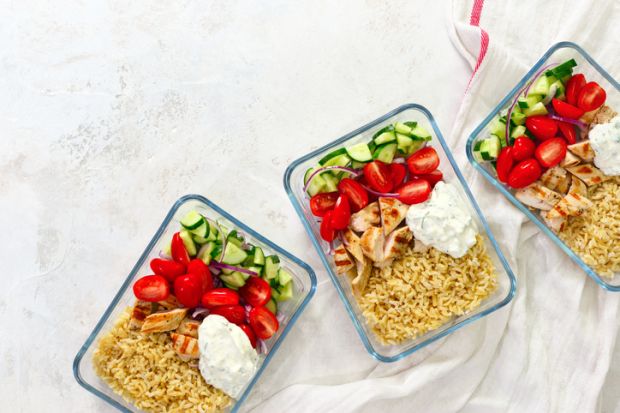
Meal prepping is a habit that can save you so much time and money. Spend a couple of hours on a weekend planning and cooking your meals for the rest of the week and you’ll find that you have so much more time to socialise and study and you’ll spend much less on takeaways.
However, meal prep is not a new concept, so it’s likely you’ve already seen a lot of tips on how to get it right. So we’ve pulled together some fresh ideas to get you into the habit of meal prepping.
1. Choose one protein
This is more a tip for the meat and fish eaters. Animal-based products will probably be the most expensive thing on your shopping list, so limit yourself to one each week, and cook a variety of dishes with that one.
For example, if you decide to buy chicken, cook fajitas one day and then turn it into a curry the next. Or if you pick salmon, bake it one day and turn it into fishcakes the next.
This means that you still get a variety in your dishes, but you won’t spend money on expensive ingredients that you might just end up wasting.
2. Choose ingredients that multitask
This is where you’ll need to spend a little time doing some research. Pick two or three recipes for the week that use similar ingredients, so you’ll limit the number of items you need to buy (thus keeping down the cost) and you’ll be less likely to waste food.
For example, you could get some mince (soy or meat), potatoes, frozen peas and carrots. Make a big batch of bolognese and separate into four portions. Have one portion with pasta, turn two into a pie topped with mashed potato and eat the final one with a jacket potato. This way you get the most out of your ingredients and won’t allow vegetables or meat to languish in your fridge after you’ve only used half of them.
3. Stock up on staples
At the start of every term, buy some basic ingredients in bulk. These are things that you know you can always turn into a meal (with a few supplementary ingredients) and that are cheaper bought in bulk.
This will vary depending on your taste and diet, but a good place to start is pasta, rice, lentils/beans, frozen vegetables, tinned tomatoes, oil, potatoes, herbs and spices. This is entirely dependent on what you like to cook. Don’t buy chilli powder if you hate spicy food buy always have soy sauce if you love Chinese food. You could also include frozen versions of things that you eat regularly, such as prawns, sausages or mince.
4. Mix it up
Meal prepping can get a bit boring if you end up eating the same thing over and over again. Keep a list in your phone of recipes that you enjoy cooking (or get a notebook if you prefer to write them down) and add to it every time you discover a new recipe. This way you’ll always have a selection of recipes to choose from when inspiration is running low.
And if you get bored of eating the same thing in one week, cook smaller batches of two or three things and alternate having them for dinner or lunch.
Five tips to make the most of your university experience
Top five apps for managing student finance
Top 10 university hacks from some of the UK’s most successful students and graduates
#THEUniAdvice: advice for starting university
5. Pre-chop vegetables and cook grains
If you don’t really have time to prep all of your meals for the week, don’t worry. There are smaller things you can do, such as chopping vegetables as soon as you bring them home, or cooking your rice or couscous in a big batch for the week.
Then when you come to make dinner, you just have to cook the remaining components and your food will be ready in less time than if you had to chop and prepare everything from scratch.
6. Know your schedule
Always check your calendar for the upcoming week to make sure you only prep the amount of meals you need. Don’t spend time cooking a big batch of three or four things if you have a busy week and will only be eating dinner at home a couple of nights. Or if you are going to spend your week at home then be sure to cook a little extra.
7. Consider portable food and your appliances at the other end
This is more of a tip for lunches. If you are planning to stay at university all day, make sure your lunch is portable and something that doesn’t require heating up if you don’t have access to a microwave. So things such as sandwiches, salads or wraps are good lunches to take to campus.
Having convenient food will mean you’ll be more likely to actually eat it.
8. Keep it simple
Meal prep doesn’t have to be a huge or complicated chore. While some weekends you might want to experiment and cook more complex dishes, other times you will only have a short amount of time to get your meals together.
This is where one-pot dishes such as curry, chilli, chicken and roast vegetables or a pasta bake will work well. You can quickly put them together and leave to cook while you study or do some reading, and will leave you with minimal washing up.
Read more: Five steps to eating well at university


















Have your say